2022 Humanities Professional Pathways Graduate Fellows
Humanities Professional Pathways Fellows pitch skill-building placements with cultural institutions, on or off campus, which serve or collaborate with publics beyond the academy. They spend their summer working with these institutions toward a project goal and then fall learning how to turn that experience into a piece of public writing with our special guest workshop instructor, Kelly Alexander.
 Ariana Ávila (she/ella) is a doctoral student of medical/sociocultural anthropology interested in care, health, U.S. immigration status, racialization, and food apartheid among farmworkers and their families working/living in rural Southwest Florida. She is a part of the Population Science Training Program at the Carolina Population Center; the Graduate Certificate in Literature, Medicine, and Culture; and, the Graduate Certificate in Participatory Research. She earned her Bachelor’s of Science from the University of South Florida and her Master’s in Public Health from Tulane University School of Public Health and Tropical Medicine. Prior to beginning her PhD program, she served as a Global Health Fellow with the Centers for Disease Control and Prevention in Port-Au-Prince, Haiti (2016-2019). She is from a Mexican migrant farmworker family, born and raised in Arcadia, Florida. She loves cooking, gardening, plants, and most of the time, blending the three.
Ariana Ávila (she/ella) is a doctoral student of medical/sociocultural anthropology interested in care, health, U.S. immigration status, racialization, and food apartheid among farmworkers and their families working/living in rural Southwest Florida. She is a part of the Population Science Training Program at the Carolina Population Center; the Graduate Certificate in Literature, Medicine, and Culture; and, the Graduate Certificate in Participatory Research. She earned her Bachelor’s of Science from the University of South Florida and her Master’s in Public Health from Tulane University School of Public Health and Tropical Medicine. Prior to beginning her PhD program, she served as a Global Health Fellow with the Centers for Disease Control and Prevention in Port-Au-Prince, Haiti (2016-2019). She is from a Mexican migrant farmworker family, born and raised in Arcadia, Florida. She loves cooking, gardening, plants, and most of the time, blending the three.
Natasza Gawlick is a fourth year PhD student in the Carolina-Duke Joint 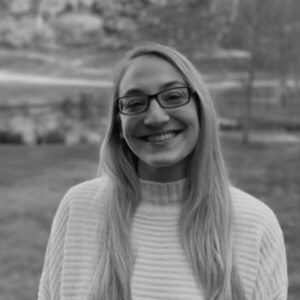 Graduate Program in German Studies. Her current research interests focus on spatiality, trauma and identity in Sinti and Roma literature of the 20th and 21st century. Natasza’s dissertation explores changing understandings of “collectivity” and “home” in works of literature by Mariella Mehr, Ceija Stojka and others. Natasza serves on the editorial collective at the DDGC (Diversity, Decolonization and the German Curriculum) Blog and is interested the role that digital humanities and virtual spaces (such as websites, forums, etc.) can play in creating a sense of community. With the generous funding and support of the Humanities Professional Pathway Award, Natasza will create a virtual exhibit featuring works of arts, literature and music by Roma creators. This exhibit aims to dismantle harmful stereotypes and clichés, and showcase the diversity of Roma cultures in an accessible and engaging format for the general public.
Graduate Program in German Studies. Her current research interests focus on spatiality, trauma and identity in Sinti and Roma literature of the 20th and 21st century. Natasza’s dissertation explores changing understandings of “collectivity” and “home” in works of literature by Mariella Mehr, Ceija Stojka and others. Natasza serves on the editorial collective at the DDGC (Diversity, Decolonization and the German Curriculum) Blog and is interested the role that digital humanities and virtual spaces (such as websites, forums, etc.) can play in creating a sense of community. With the generous funding and support of the Humanities Professional Pathway Award, Natasza will create a virtual exhibit featuring works of arts, literature and music by Roma creators. This exhibit aims to dismantle harmful stereotypes and clichés, and showcase the diversity of Roma cultures in an accessible and engaging format for the general public.
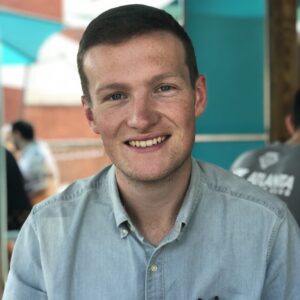 Craig Gill is a fourth year PhD candidate in the History department. He is the 2021-2022 Southern Pines Land and Housing Trust Community History Fellow. Craig will use his historical training in working with the SPLHT to help collect the history of West Southern Pines, one of the first incorporated Black towns in North Carolina. It is hoped that the information and materials collected will be used to share the history of the area with a public audience in a planned cultural heritage site in West Southern Pines. His dissertation focuses on the lives of Black golf caddies in the US South over the course of the twentieth century.
Craig Gill is a fourth year PhD candidate in the History department. He is the 2021-2022 Southern Pines Land and Housing Trust Community History Fellow. Craig will use his historical training in working with the SPLHT to help collect the history of West Southern Pines, one of the first incorporated Black towns in North Carolina. It is hoped that the information and materials collected will be used to share the history of the area with a public audience in a planned cultural heritage site in West Southern Pines. His dissertation focuses on the lives of Black golf caddies in the US South over the course of the twentieth century.
Maja Jeranko is a PHD Candidate in the Anthropology  Department, where she focuses on disasters, gender, and development studies. She works in a coastal Ecuadoran village where she analyses the impacts of multiple disasters (floods, earthquakes, pandemics) on gender relations and women’s capacities and strategies to face future disasters. For her HPP project, she is working with a local community library to design and implement a series of capacity-building workshops for women. Prior to UNC, Maja obtained an MA in Latin American Studies from the University of Florida, and a BA in Sociology and Languages from the University of Ljubljana, Slovenia.
Department, where she focuses on disasters, gender, and development studies. She works in a coastal Ecuadoran village where she analyses the impacts of multiple disasters (floods, earthquakes, pandemics) on gender relations and women’s capacities and strategies to face future disasters. For her HPP project, she is working with a local community library to design and implement a series of capacity-building workshops for women. Prior to UNC, Maja obtained an MA in Latin American Studies from the University of Florida, and a BA in Sociology and Languages from the University of Ljubljana, Slovenia.
Zardas Shuk-man Lee is a PhD candidate in the Department of History. Their current work explores how small colonies in South and Southeast Asia strove for freedom and independence in the mid-20th century. They are collaborating with the Hong Kong History Project, based in University of Bristol in Britain, to develop a podcast series in English and Cantonese, which will introduce the global history of Hong Kong to public audiences within and beyond the Anglophone world.
Emily McDonnell is a proud citizen of the Navajo Nation 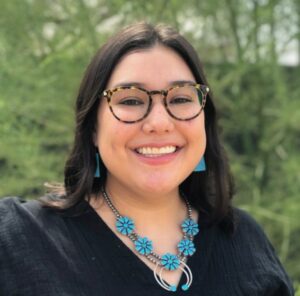 and is a 2nd year PhD Student in American Studies. She has an M.P.A. from Arizona State University and a B.S. with a minor in American Indian Studies from the University of Arizona. As a Professional Pathway fellow, she working with the North Carolina Commission of Indian Affairs to research the impact of COVID-19 on North Carolina tribal communities and document oral histories. Her research interests include cultural/political geography, cultural tourism, and collective memory. In her spare time she enjoys running, exploring her new surroundings in the Triangle area, and is actively involved in the local Jewish community.
and is a 2nd year PhD Student in American Studies. She has an M.P.A. from Arizona State University and a B.S. with a minor in American Indian Studies from the University of Arizona. As a Professional Pathway fellow, she working with the North Carolina Commission of Indian Affairs to research the impact of COVID-19 on North Carolina tribal communities and document oral histories. Her research interests include cultural/political geography, cultural tourism, and collective memory. In her spare time she enjoys running, exploring her new surroundings in the Triangle area, and is actively involved in the local Jewish community.
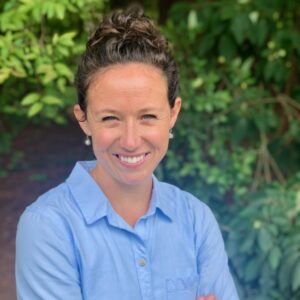 Elaine Schnabel is a PhD candidate in the communication department at UNC. She studies how Christian organizations in the United States create meaningful and moral identities for themselves through discourse and materiality. She is particularly interested in the ways Christian language—or language about American Christianity—produces inclusion and exclusions in the United States. Her work appears in Critical Studies in Media Communication and the Journal of Communication and Religion. Her dissertation project examines Christian place-making in the United States through interviews with people who design, lead, and leave Christian churches. The project centers on the following question: what does it mean for a space or building to be called a church and what are the effects of those constructions? During this summer with HPG, she will be working with Durham CAN to design a toolkit for congregations seeking to use their church buildings for social justice work.
Elaine Schnabel is a PhD candidate in the communication department at UNC. She studies how Christian organizations in the United States create meaningful and moral identities for themselves through discourse and materiality. She is particularly interested in the ways Christian language—or language about American Christianity—produces inclusion and exclusions in the United States. Her work appears in Critical Studies in Media Communication and the Journal of Communication and Religion. Her dissertation project examines Christian place-making in the United States through interviews with people who design, lead, and leave Christian churches. The project centers on the following question: what does it mean for a space or building to be called a church and what are the effects of those constructions? During this summer with HPG, she will be working with Durham CAN to design a toolkit for congregations seeking to use their church buildings for social justice work.
Emily Taylor is a doctoral candidate in the history department at the University of North Carolina at Chapel Hill, where she is currently 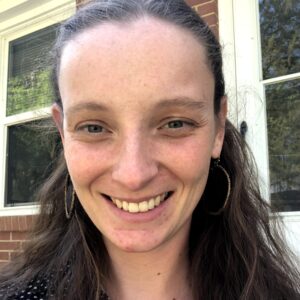 working on her dissertation, tentatively titled “We have made the Government Tremble:” Gender and Ethnicity in the Guatemalan Popular Movement, 1976-1996. Emily received her BA in History from Davidson College in 2016 and my MA in History from UNC-CH in 2021. Her research and teaching interests include state violence, social movements, gender, historical memory, and Maya linguistics, focusing on K’iche’ Maya. This summer, Emily will be working with the Mayan Language Institute to support their K’iche’ program in Xela, Guatemala.
working on her dissertation, tentatively titled “We have made the Government Tremble:” Gender and Ethnicity in the Guatemalan Popular Movement, 1976-1996. Emily received her BA in History from Davidson College in 2016 and my MA in History from UNC-CH in 2021. Her research and teaching interests include state violence, social movements, gender, historical memory, and Maya linguistics, focusing on K’iche’ Maya. This summer, Emily will be working with the Mayan Language Institute to support their K’iche’ program in Xela, Guatemala.
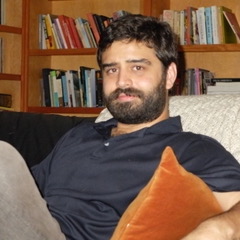 Alejandro Hermes Moreiras Vilaros is a Ph.D. graduate student in Religious Studies at the University of North Carolina at Chapel Hill. He holds an M.A. from the Hebrew University of Jerusalem and a B.A. from Hampshire College with a Five College Certificate in Middle Eastern Studies.
Alejandro Hermes Moreiras Vilaros is a Ph.D. graduate student in Religious Studies at the University of North Carolina at Chapel Hill. He holds an M.A. from the Hebrew University of Jerusalem and a B.A. from Hampshire College with a Five College Certificate in Middle Eastern Studies.
Rachel Warner is a PhD Candidate and Teaching Fellow in the Department of English and Comparative  Literature at UNC Chapel Hill. Her dissertation, “Transmasculine Modernism: Inverts, Tomboys, and Drag Kings, 1890-1940,” explores intersecting histories of queer sexuality, gender variance, and racial formation in Anglo-American high modernism and the Harlem Renaissance.
Literature at UNC Chapel Hill. Her dissertation, “Transmasculine Modernism: Inverts, Tomboys, and Drag Kings, 1890-1940,” explores intersecting histories of queer sexuality, gender variance, and racial formation in Anglo-American high modernism and the Harlem Renaissance.
Past Fellows
2021: Michael Bramwell, Kylie Broderick, Yasmine Flodin-Ali, Sugandh Gupta, Anna Hamilton, Stephanie Kaczynski, Sierra L. Lawson, and Francesca Sorbara
2020: Nora Augustine, John Bechtold, Mary Biggs, Adrienne Hall, Andreina Malki, Jane McGrail, Smita Misra, Shreya Parikh, Sofia Salazar, and Julio Villa-Palomino

